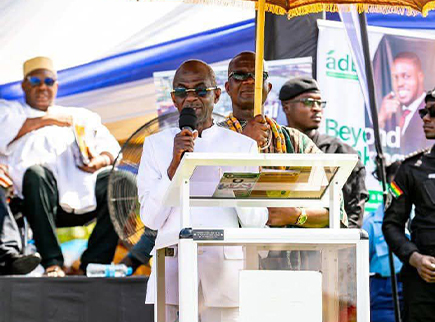Mr Johnson Asiedu Nketia, National Chairman of the National Democratic Congress (NDC), says the party holds a strong historical connection to the Anlo State, a bond that continues to draw them to the annual Hogbetsotso Festival.
Speaking at the 63rd edition of the festival in Anloga, Mr Nketia explained that the roots of the NDC could be traced to the Anlo State; therefore, the party remains committed to supporting its culture, values, and development needs.
“We are always attached to this celebration because of historical reasons. Whether we like it or not, our roots as a political party are from the Anlo State. We will always identify with the culture and traditions of the Anlo people, and whenever they require our support, we are ready to reciprocate,” he said.
He used the platform to remind Ghanaians of the critical role the chieftaincy institution played in governance — an institution, he noted, that pre-dated the arrival of Europeans.
“Our chiefs governed us before the Europeans came. They could not succeed in wiping away our traditional institutions. In practicing democracy today, we must ensure continuous partnership with our chiefs. Every politician, soldier, or police officer defers to the authority of traditional leaders,” he stated.
Mr Nketia emphasised that the 1992 Constitution deliberately shields the chieftaincy institution from partisan interference to enable chiefs to serve as neutral arbiters in times of political tension.
“There is a reason we insulated the chieftaincy institution from partisan politics — so that when politicians go astray and create crises, our chiefs can call us to order,” he emphasised.
Touching on ongoing calls for constitutional reforms to allow chiefs to engage in partisan politics, Mr Nketia expressed strong disagreement.
“I do not support such calls. Our chiefs must remain the custodians of peace. If we turn the chieftaincy institution into a partisan arena, we lose that stabilizing force,” he warned.
Mr Nketia further raised concern over the increasing number of chieftaincy disputes consuming national resources.
“Government is spending huge sums meant for development on deploying security to manage chieftaincy conflicts. If the institution is empowered to resolve its own challenges, we will save resources and promote development,” he added.
He urged Ghanaians to uphold values of unity, justice, and accountability in safeguarding the peace of the nation.
Mr James Gunu, the Volta Regional Minister, said the Regional Coordinating Council, in partnership with the Regional House of Chiefs, had undertaken a capacity-building programme for the Judicial Committee of the House.
He said during his visit earlier this year, he was informed that there were 69 pending chieftaincy cases — a situation that was affecting peace and slowing development efforts in the region.
”I am pleased to report that, as a result of this initiative, three of those cases have already been resolved. We remain hopeful that the remaining cases will be settled in due course to ensure lasting peace, harmony, and unity in our beloved region” he said.
”Let us continue to work together — hand in hand — to advance the development, peace, and progress of our region and our nation as a whole.”
The Awadada of Anlo, Torgbui Agbesi Awusu II, delivering his address on the theme: “Building Bridges: From a Common History to a Common Destiny,” called for renewed commitment to peace, communal cooperation, and shared development goals.
He said the theme reflected the shared history of the Ewe people — one of migration, resilience, and triumph — and a shared future defined by dignity and progress.
“The bridges we must build today are not of concrete and steel, but of understanding, cooperation, and shared purpose,” he said.
He emphasised unity across the various traditional areas including Aflao, Avenor, Dzodze, Some, Ave and Anlo, noting that challenges such as youth unemployment, environmental degradation, and social division require collective response.
“Our shared destiny demands effort from all — from the chief in his palace, the market woman in her stall, the student in Keta, and the fisherman at Dzelukope, to our sons and daughters abroad who keep our culture alive,” he added.
“Hogbe is not just a festival — it is a movement of renewal. Unity is our strength, and pride in our identity is the foundation of our progress,” he stated.
He called on Anlo citizens and Ewes across the world to remain united, build bridges across communities and borders, and continue the collective journey from their common history towards a common and prosperous destiny.

